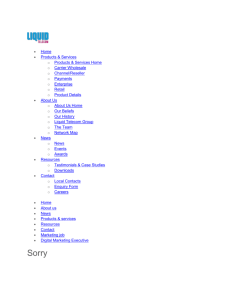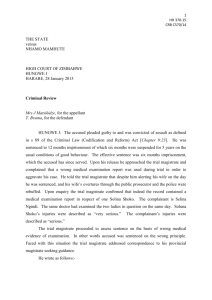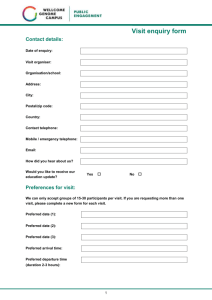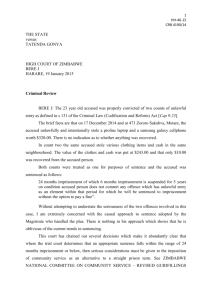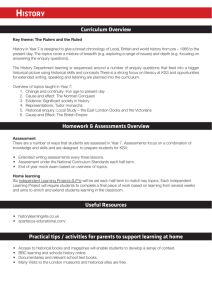The Indictable Offences (Preliminary Enquiry)(Amendment) Bill, 2005
advertisement
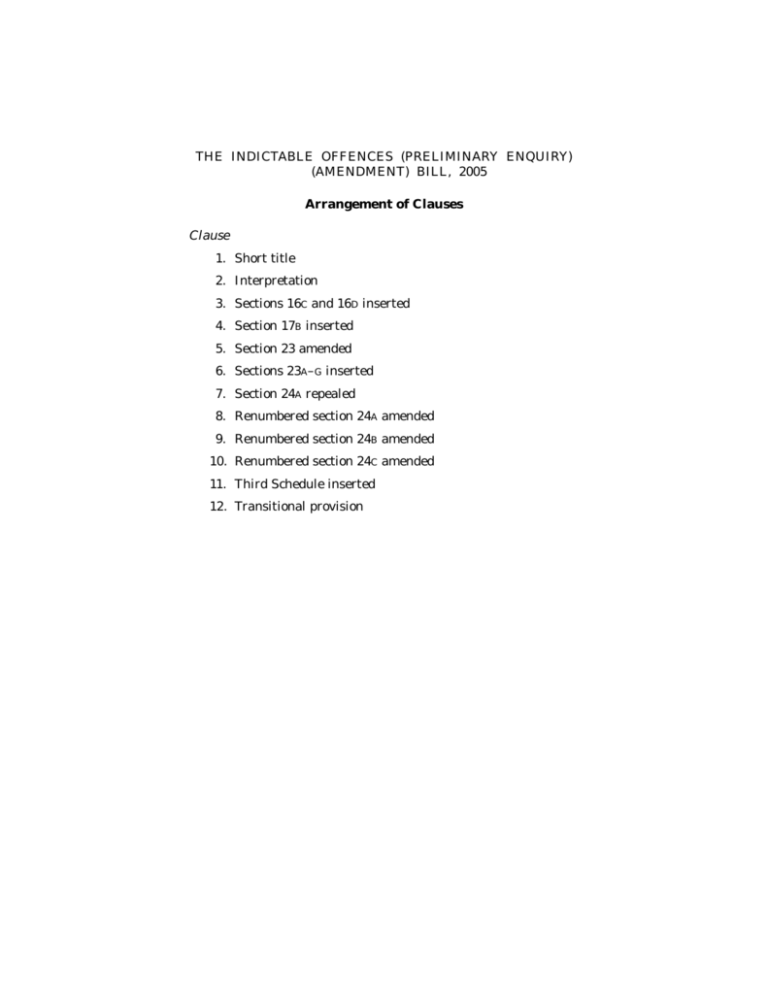
THE INDICTABLE OFFENCES (PRELIMINARY ENQUIRY) (AMENDMENT) BILL, 2005 Arrangement of Clauses Clause 1. Short title 2. Interpretation 3. Sections 16C and 16D inserted 4. Section 17B inserted 5. Section 23 amended 6. Sections 23A–G inserted 7. Section 24A repealed 8. Renumbered section 24A amended 9. Renumbered section 24B amended 10. Renumbered section 24C amended 11. Third Schedule inserted 12. Transitional provision Legal Supplement Part C to the “Trinidad and Tobago Gazette’’, Vol. 41, No. 221, 21st November, 2002 No. 12 of 2005 Third Session Eighth Parliament Republic of Trinidad and Tobago HOUSE OF REPRESENTATIVES BILL AN ACT to amend the Indictable Offences (Preliminary Enquiry) Act, Chap.12:01 PRINTED BY THE GOVERNMENT PRINTER, PORT-OF-SPAIN REPUBLIC OF TRINIDAD AND TOBAGO—2005 2 THE INDICTABLE OFFENCES (PRELIMINARY ENQUIRY) (AMENDMENT) BILL, 2005 Explanatory Note (These notes form no part of the Bill but are intended only to indicate its general purport) The Bill seeks to modify the amendments to the Indictable Offences (Preliminary Enquiry) Act, Chap. 12:01, which were introduced in 1994 (Act No. 20 of 1994) to provide for the committal of accused persons on the basis of written statements submitted by the prosecution to the enquiring Magistrate. The 1994 amendments, which were intended to speed up preliminary enquiries, proved ineffective because the Magistrate was obliged to take the evidence of an accused person who wished to give evidence and to allow the cross-examination, if desired, of the maker of a tendered statement. It is on record that since the enactment of these provisions only three such preliminary enquiries were concluded, thus defeating the purpose for which the amendments were intended. The Bill would first provide the conditions upon which a written statement by either party to a preliminary enquiry may be tendered into evidence and then set out the procedure a party must follow in order to have such a statement admitted into evidence. The Bill then goes on to provide two methods whereby a Magistrate may commit an accused person on the basis of a “paper committal”. The first method is to make an order of committal without consideration of the statement. However, the Magistrate cannot follow this method where the accused is not represented by counsel or counsel for the accused wishes to make a no case submission. The second method is to consider the statement and allow both parties to make submissions to the court before making a committal order. The Bill would also confer on the Director of Public Prosecutions the power to prefer a voluntary bill of indictment without reference to a judge of the High Court and whether or not a preliminary enquiry has been held. Clause 1 would provide the short title of the Act, for which this is the Bill. Clause 2 would provide the interpretation provision. 3 Clause 3 would insert two new sections—sections 16C and 16D. The proposed section 16C would provide for the admissibility of written statements as evidence in a preliminary enquiry if certain conditions are satisfied. Among the conditions specified are that the statement is signed by the witness, sworn before a Clerk of the Peace or Justice of the Peace, and served on the defence as soon as practicable before it is tendered in evidence. Section 16C also proposes that the Magistrate may also call the maker of a written statement to attend the enquiry to give oral evidence, and once the defence accepts service of the written statement, they are precluded from requesting a preliminary enquiry by way of oral evidence. The proposed section 16D would provide for the filing of a copy of the written statement with the Clerk of the Peace, for the proper identification of any document or object referred to in a written statement, and for the procedure to admit a written statement in evidence. Clause 4 would seek to insert a new section, section 17B, after section 17A. The proposed section 17B would provide for the tendering into evidence of a written statement of an accused person, and for its admission as evidence in the trial. Clause 5 seeks to amend section 23 of the Act to allow the Director of Public Prosecutions the sole discretion to indict an accused person, without reference to the High Court. Clause 6 would seek to insert five new sections after section 23 of the parent Act: sections 23A – G. The proposed section 23A would allow the Magistrate to commit the accused person for trial without considering the contents of the written statement tendered under section 16C unless the accused is unrepresented or counsel for the accused makes a no case submission. The proposed section 23B would provide for a committal based on the written statements tendered in evidence. This proposed section would allow the accused to submit that a prima facie case was not made out, and for a rebuttal by the prosecution. Thereafter the Magistrate may either commit or discharge the accused based on a consideration of all the evidence. The proposed section 23C would deem a statement admitted in evidence under section 16C to be a deposition. 4 The proposed section 23D would retain an accused person’s right of cross-examination in a preliminary enquiry. The proposed section 23E would make it a summary offence for the maker of a written statement, which is tendered in evidence, wilfully to make a false statement or a statement which he believes is not true. The proposed section 23F would provide that section 55 and Part VI of the Summary Courts Act, Chap. 4:20 shall not apply to proceedings under this amendment Act. The proposed section 23G would confer, as of right, a right of appeal to the State to only the Court of Appeal against a decision of the High Court made under section 23 of the parent Act. Section 23 of the parent Act allows the Director of Public Prosecutions to apply to the High Court to have an accused, who is discharged by the enquiring Magistrate, to be committed for trial. Clause 7 seeks to repeal section 24A of the parent Act and renumber the prevailing sections 24B to 24D as sections 24Ato 24C. Clause 8 seeks to amend the renumbered section 24A by deleting the reference to “section 24A” (which is repealed by clause 6) and to insert the reference to “section 23A(1) or 23B(9)”. Clause 9 seeks to amend the renumbered section 24B by removing the reference to “section 24A” and inserting the reference to “section 23A or 23B”. Clause 10 seeks to amend the renumbered section 24C by removing the reference to “section 24A” and inserting the reference to “section 23A or 23B”. Clause 11 would seek to insert a Third Schedule in the Act to provide a form to be used for the acceptance of written statements. Clause 12 provides that this amending Act shall not apply retrospectively. 5 BILL AN ACT to amend the Indictable Offences (Preliminary Enquiry) Act, Chap.12:01 [ , 2005] ENACTED by the Parliament of Trinidad and Tobago as follows:— 1. This Act may be cited as the Indictable Offences (Preliminary Enquiry) (Amendment) Act, 2005. 2. In this Act, “the Act” means the Indictable Offences (Preliminary Enquiry) Act. Enactment Short title Interpretation Chap. 12:01 6 Sections 16C and 16D inserted 3. The Act is amended by inserting immediately after section 16B the following new sections: “Admissibility of written statements Chap. 46:01 16C. (1) Notwithstanding sections 16 and 18, in a preliminary enquiry a written statement by a witness shall, if the conditions mentioned in subsection (3) are satisfied, be admissible as evidence to the like extent as oral evidence to the like effect by that witness. (2) Where a child is a witness in a preliminary enquiry, the Magistrate shall first comply with section 19 of the Children Act and then this section shall be applied to any written statement made by such a witness. (3) The conditions referred to in subsection (1) are that— (a) the statement purports to be signed by the witness who made it; (b) the statement was sworn before a Justice of the Peace and shall be authenticated by a certificate signed by him; (c) the statement contains a declaration by the witness who made the statement to the effect that it is true to the best of his knowledge and belief and that he made the statement knowing that, if it were tendered in evidence, he would be liable to prosecution if he wilfully stated in it anything which he knew to be false or did not believe to be true; 7 (d) b e f o r e t h e s t a t e m e n t i s tendered in evidence a copy of the statement is given, by or on behalf of the party proposing to tender it, to each of the other parties to the proceedings; and (e) none of the other parties, b e f o r e t h e s t a t e m e n t i s tendered in evidence, at the preliminary enquiry, objects to t h e s t a t e m e n t b e i n g s o tendered under this section. (4) The following provisions shall also have effect in relation to any written statement admitted in evidence under this section, that is to say— (a) if the statement is made by a witness under eighteen years of age, it shall state his age and that an adult of his choice was present with him when it was made; (b) if the statement is written on behalf of a witness it shall be signed by both the witness and the person who wrote it and dated; (c ) if the statement is written on behalf of a witness who cannot read, the person who wrote it shall read it to him before he signs it and it shall be accompanied by a declaration by the person who wrote it that it was so read to the witness and he appeared to understand it and he agreed to it; (d) if the statement is written on behalf of a witness who cannot write, the person who wrote the 8 statement shall read it to the witness before he puts his mark or thumbprint on it and it shall contain a declaration by the person who wrote it that it was read to the witness and he appeared to understand it and he agreed to it; and (e) if the statement refers to any other document as an exhibit, the copy of the statement given to any other party to the enquiry under subsection 3(d) shall be accompanied by a copy of that document or by such information as may be necessary in order to enable the party to whom it is given to inspect that document or a copy of it. (5) Where any party objects to the admissibility of a written statement under subsection (3)(e), the Magistrate shall make a ruling on the objection and where he overrules the objection, the statement shall be admitted in evidence in accordance with subsection (1). (6) So much of any statement as is admitted in evidence by virtue of this section shall, unless the Magistrate commits the accused for trial by virtue of section 23A(1) or the Magistrate otherwise directs, be read aloud at the hearing, and where the Magistrate so directs, an account shall be given orally of so much of any statement as is not read aloud. (7) A document or an object referred to as an exhibit and identified in a written statement tendered in evidence under this section shall be treated as if 9 it had been produced as an exhibit and identified in court by the maker of the statement. (8) Section 39(1) shall apply to any written statement tendered in evidence in a preliminary enquiry under this section as it applies to a deposition taken in such proceedings, but in its application to any such statement that subsection shall have effect as if paragraphs (b) and (c) thereof were omitted. (9) Where the written statements to be tendered in evidence are given by the prosecution and accepted by the accused and his attorney-at-law, the accused is not entitled thereafter to object to a preliminary enquiry in accordance with section 23 A or 23 B and the Magistrate shall proceed to conduct the enquiry in accordance with section 23A or 23B. (10) Where the accused and his attorney-at-law accepts the written statements given by the prosecution, the accused and his attorney-at-law shall sign Part A and Part B respectively of the form set out in the Third Schedule. Procedure 16D. (1) A written statement shall be filed with the Clerk of the Peace of the Magistrates’ Court by either party and a filed copy shall be served on the other party to the enquiry as soon as practicable thereafter. (2) A written statement filed under subsection (1) by either party to the enquiry shall be tendered by such party and may be admitted into evidence by the 10 Magistrate under section 16C(1), and where a statement is so admitted it shall be marked by the Magistrate as a court exhibit and kept together with all the other written statements and any other depositions. (3) Where a statement is to be admitted in evidence under section 16C(1) and the Magistrate is of the opinion that a part of it is inadmissible there shall be written against that part the words “treated as inadmissible” together with the signature of the Magistrate. (4) Where it is not possible to write on the statement, the words set out in subsection (3) shall instead be written on a label or other mark of identification which clearly identifies the part of the statement to which the words relate and contains the signature of the Magistrate in accordance with that subsection and which shall be attached to the statement. (5) Where a written statement, admitted in evidence under section 16C(1), refers to any document or object as an exhibit, that document or object shall wherever possible be identified by means of a label or other mark of identification signed by the maker of the statement and before the Magistrate treats any document or object referred to as an exhibit in such a statement as an exhibit produced and identified in court by the maker of the statement, the Magistrate shall be satisfied that the document or object is sufficiently described in the statement for it to be identified. 11 (6) Where, during the conduct of a preliminary enquiry, a written statement is admitted in accordance with section 16C(1) the name of the maker of the statement shall be read aloud unless the Magistrate otherwise directs. (7) Where during the conduct of a preliminary enquiry before a Magistrate under section 16C(6), any part of a written statement has to be read out aloud or an account has to be given orally of so much of a written statement as is not read out aloud, the statement shall be read or the account given by or on behalf of the party who has tendered the evidence. (8) T h e w r i t t e n s t a t e m e n t s admitted into evidence by the Magistrate under section 16C(1) are deemed to be the evidence in chief of each witness for the purpose of section 23A or 23B. (9) Notwithstanding this section, an accused person is entitled to submit to the Magistrate that any part of a statement is inadmissible in evidence.”. 4. The Act is amended by inserting after section 17A Section 17B inserted the following new section: “Accused and his witness may tender written statement 17B. (1) Without prejudice to sections 17 and 17A, the Magistrate, acting under section 23A or 23B, shall also inform the accused person that he is entitled to tender a written statement into evidence and to call any witness who is entitled to tender a written statement into evidence. (2) Where the accused person or any of his witness decides to tender a written statement, he shall give a copy of it to the prosecution, and the original to the 12 Magistrate who shall mark it as a court exhibit and it shall be kept together with the other written statements and any depositions. (3) The written statement of the accused person and his witness if any may be admitted in evidence at the trial without further proof thereof unless it is proved that the accused or the witness, where such statement purports to have been signed by the accused or the witness, did not in fact sign it.”. Section 23 amended 5. Section 23 of the Act is amended by— (a) renumbering subsection (8) as subsection (9); and (b) inserting after subsection (7), the following subsection: “ (8) Notwithstanding subsections (5), (6) and (7) the Director of Public Prosecutions or the Deputy Director of Public Prosecutions or any person authorized in that behalf by the Director of Public Prosecutions, may prefer an indictment whether or not a preliminary enquiry has been conducted.”. Sections 23A-G inserted 6. The Act is amended by inserting immediately after section 23 the following new sections: “Committal 23A. (1) A M a g i s t r a t e h o l d i n g a without consideration preliminary enquiry shall, if satisfied that of the all the evidence before the court, whether written statements for the prosecution or the accused person, consists of written statements admitted under section 16C(1), with or without exhibits, commit the accused for trial for the offence without consideration of the contents of those statements. 13 (2) Subsection (1) shall not apply where the— (a) accused or one of the accused is not represented by an attorneyat-law; or (b) attorney-at-law for the accused or one of the accused, as the case may be, has requested the Magistrate to consider a submission that the statements disclose insufficient evidence to put that accused on trial by jury for the offence. (3) If the Magistrate is satisfied that the attorney-at-law for the accused or, as the case may be, the attorney-at-law for each of the accused does not wish to make a submission as provided for under subsection (2)(b) the Magistrate shall, after receiving any written statement under section 16C(1), commit the accused for trial without consideration of the evidence. (4) Where a Magistrate commits an accused person for trial under this section he shall comply with sections 16A, 17A and 23(2). (5) Where the Magistrate does not commit the accused under this section he shall proceed in accordance with section 23B. Committal based on the written statements 23B. (1) A M a g i s t r a t e h o l d i n g a preliminary enquiry, who does not commit an accused person under section 23A, and having ascertained that the— (a) accused has no attorney-at-law acting for him in the enquiry; 14 (b) attorney-at-law for the accused has requested the Magistrate to consider a submission that there is insufficient evidence to put the accused on trial by jury for the offence with which he is charged; or (c) accused or his attorney-at-law wishes to cross-examine any of the witnesses for the prosecution, shall permit the prosecutor to tender to the court any statement that is in compliance with section 16C. (2) After the prosecutor tenders any statement as provided for under subsection (1), the Magistrate shall admit the written statements in accordance with section 16C(1), and it shall be read out aloud, except where the Magistrate otherwise directs the prosecutor or to the extent that he directs the prosecutor that an oral account be given of any statement. (3) The Magistrate may view any exhibits produced before him and may take possession of them. (4) After all the evidence including the written statements on behalf of the prosecution have been admitted and subject to the right of the accused under section 23D, the Magistrate shall hear any submission which the accused may wish to make as to whether there is sufficient evidence to put him on trial by jury for any indictable offence. 15 (5) The Magistrate shall permit the prosecutor to make a submission— (a) in reply to any submission made by the accused in pursuance of subsection (4); or (b) where the accused has not made any such submission but the Magistrate is nevertheless minded not to commit him for trial. (6) After hearing any submission made in pursuance of subsection (4) or (5), the Magistrate shall, unless he discharges the accused person, comply with sections 16 A , 17 A and 23(2) with appropriate modification of the language of the sections in relation to the relevant circumstances. Depositions Crossexamination False written statements tendered in evidence 23C. A written statement admitted in evidence under section 16C is deemed to be a deposition within the meaning of section 16(3). 23D. Where a Magistrate holding a preliminary enquiry admits written statements of a person under section 23A or 23B, a party to the enquiry or an attorneyat-law acting on behalf of that party is entitled to cross-examine the maker of any statement admitted in evidence. 23E. A p e r s o n w h o , i n a w r i t t e n statement admitted in evidence in a preliminary enquiry by virtue of section 16C, wilfully makes a statement material in the preliminary enquiry which he knows to be false or does not believe to be true commits an offence and is liable on summary conviction to a fine of fifty thousand dollars and to imprisonment for seven years. 16 Nonapplication of certain written provisions Chap. 4:20 Appeals Section 24A repealed Renumbered section 24A amended Renumbered section 24B amended 23F. Neither section 55 nor Part VI of the Summary Courts Act shall apply to proceedings under this Act. 23G. An appeal by the State from a decision of the High Court under section 23 shall lie as of right to the Court of Appeal.”. 7. Section 24A of the Act is repealed and sections 24B to 24D are renumbered as sections 24A to 24C. 8. The renumbered section 24A of the Act is amended by deleting the words “section 24A” and substituting the words “section 23A or 23B”. 9. The renumbered section 24B of the Act is amended by— (a) deleting the words “21,”; and (b) deleting the words “section 24 A ” and substituting the words “section 23A or 23B”. Renumbered section 24C amended Third Schedule inserted 10. The renumbered section 24 C of the Act is amended by deleting the words “section 24 A ” and substituting the words “section 23A or 23B”. 11. The Act is amended by inserting after the Second Schedule the following new Schedule: “Sec. 16C THIRD SCHEDULE ACCEPTANCE OF WRITTEN STATEMENTS Complaint No……of 20… ………………………………………….............................(Complainant) Against …………………………..…...................(Accused person) on the charge of………………………..……….(State offence briefly). 17 PART A I………………..…………(name) of………..............……..(address) the accused person accept the written statements of the prosecution given to me this……….day of ………………., 20…., pursuant to section 16C of the Indictable Offences (Preliminary Enquiry) Act, Chap. 12:01. ………………………………................................................................… (Signature of accused person) PART B I…………………………… (name) of…….……….………….. (address) attorney-at-law for …………….....……...(name of the accused person) accept the written statements of the prosecution given to me this……….day of ………………., 20…., pursuant to section 16C of the Indictable Offences (Preliminary Enquiry) Act, Chap. 12:01. …………………................................................................……………… (Signature of attorney-at-law)”. 12. This Act shall not apply to a preliminary enquiry Transitional that began before the commencement of the Indictable provision Offences (Preliminary Enquiry) (Amendment) Act, 2005. Passed in the House of Representatives this 30th day of , 2005. Clerk of the House I confirm the above. Speaker 18 Passed in the Senate this 30th day of September, 2005. Acting Clerk of the Senate I confirm the above. President of the Senate No. 12 of 2005 THIRD SESSION EIGHTH PARLIAMENT REPUBLIC OF TRINIDAD AND TOBAGO BILL AN ACT to amend the Indictable Offences (Preliminary Enquiry) Act, Chap. 12:01 Received and read the First time............................................... Second time........................................... Third time..............................................




